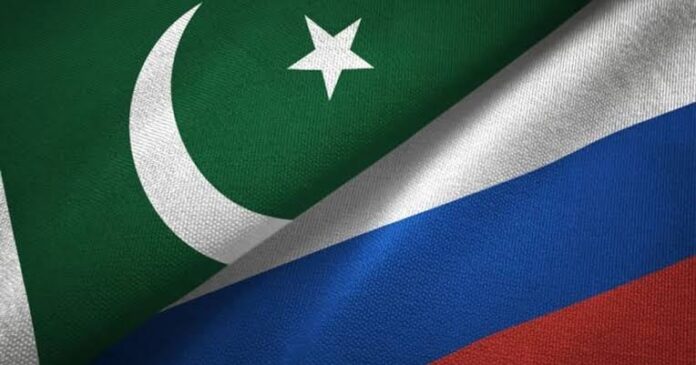Russia has been facing immense pressure due to the sanctions imposed by the West. These sanctions, led by the United States and its allies, have severely affected the Russian economy, making it difficult for businesses to conduct regular transactions and cross-border payments. As a result, Russian companies are seeking alternative ways to maintain trade, even if it means resorting to barter systems.
One recent example of this is a trade agreement between a Russian company and a Pakistani firm. In an attempt to bypass the challenges posed by international sanctions, they have struck a deal to exchange agricultural products. This form of barter trade reflects how Russia is trying to adapt to the economic challenges it faces. The deal is not about money but about the direct exchange of goods, which is becoming more common as Russia struggles to navigate the international financial system.
Barter Agreement for Food Products
The Russian company, Astarta-Agrotrading, has entered into a barter agreement with Pakistan’s Meskay & Femtee Trading Company. The deal involves the exchange of a substantial amount of food products between the two nations.
According to reports from Russian state-run news agency Tass, Astarta-Agrotrading will trade 20,000 tons of chickpeas with the Pakistani company. In return, Pakistan’s Meskay & Femtee Trading will provide 20,000 tons of rice to Russia. This trade deal showcases the creative ways in which Russia is trying to meet its needs for essential commodities without relying on traditional financial transactions.
Pakistan Proposes Barter Trade to Avoid Sanctions on Russia in SCO Summit
But the agreement doesn’t stop at rice and chickpeas. The companies have also agreed to trade additional food products. Russia will send 15,000 tons of chickpeas and 10,000 tons of lentils to Pakistan. In exchange, Pakistan will supply 10,000 tons of potatoes and 15,000 tons of tangerines. This exchange of agricultural products highlights how both countries are using their strengths to fulfill their respective needs.
Sanctions Cause Major Struggles
Since Russia’s invasion of Ukraine in 2022, the international community has imposed a wide range of sanctions. These sanctions are aimed at pressuring Russia to change its course of action. One major area that has been hit hard by these sanctions is Russia’s ability to make cross-border payments. Many Russian companies have found it increasingly difficult to conduct business as usual, particularly when it comes to international trade.
Sanctions Tighten the Noose Over Russia’s Economic Lifeline: Yuan Shortage Looms
The situation has led Russian businesses to search for alternative ways to keep trade flowing. In the past, Russia relied on international banking systems to handle payments and facilitate trade, but sanctions have made it nearly impossible for many companies to function normally. Banks are hesitant to engage with Russian businesses, and many financial institutions have cut off ties, leaving companies struggling to find ways to pay for imports or receive payments for their exports.
Bartering, which was once seen as an outdated method of trading, is becoming more relevant in Russia’s current economic landscape. By exchanging goods directly, companies can continue to trade without relying on international banking systems. While this method is far from ideal and comes with its own set of challenges, it offers a lifeline for Russian companies looking to stay afloat amid mounting sanctions.
UK Sanctions Target Russian LNG Carriers Amid Ongoing Efforts to Stifle Energy Exports
Russia’s Search for New Trade Channels
Russia’s attempt to establish new trade channels is not a new development. Since the invasion of Ukraine, the country has been looking for ways to circumvent the impact of sanctions. The Russian government and businesses have been working to establish trade agreements with countries that are not part of the sanctions effort. In particular, Russia has focused on trading with countries in Asia, the Middle East, and Africa.
The barter agreement with Pakistan is part of this broader strategy. By building stronger trade ties with countries like Pakistan, Russia hopes to secure the goods it needs without relying on Western countries or financial systems that are no longer accessible.
Aleksejs Haļavins: The Latvian Trader Behind Russia’s Oil Sanctions Evasion
In fact, this is not the first time that Russia has turned to bartering as a solution. Back in the fall of 2022, just a few months after the invasion, there were already reports of Russian companies looking for ways to trade essential goods through alternative channels. Russia has also been exploring the possibility of using national currencies in trade agreements with other countries, instead of relying on the US dollar or euro. This is another strategy aimed at reducing dependence on Western financial systems.
However, these alternative trade methods come with limitations. Barter deals, while useful in certain situations, are not a sustainable long-term solution for a country as large as Russia. The logistical challenges of matching supply and demand, as well as the complexities of transporting large quantities of goods, make barter trade a difficult and inefficient process. But for now, in the face of harsh sanctions, barter remains one of the few options available to Russian companies trying to maintain international trade.
The current situation underscores the significant challenges Russia faces as it tries to navigate a global economy that has become increasingly closed off to it. With no clear end in sight to the sanctions, Russian companies like Astarta-Agrotrading will likely continue to rely on creative solutions like barter agreements to keep trade flowing, even if it means exchanging chickpeas for tangerines.


